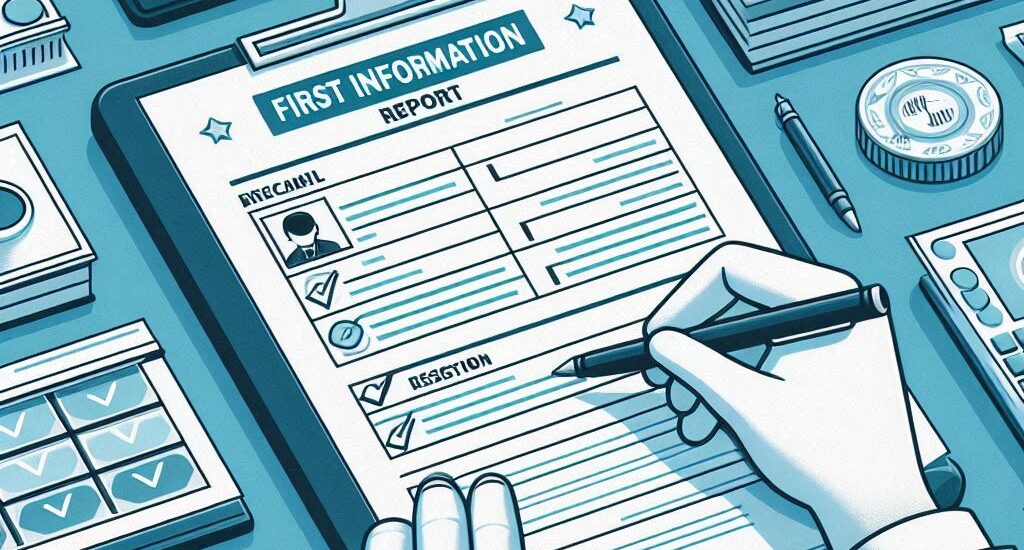
Leeza Lowanshi, National Law University Odisha
What Is FIR?
An FIR, or First Information Report, is a document that records details of a crime reported by the victim. It’s the First step in a criminal justice process and must be accurate before any action is taken. Registering an FIR online is Important for any complaint.
FIR: The First Step to Justice in Law Enforcement?
An FIR, or First Information Report, is a key document in law enforcement that records a complainant’s statement accurately and serves as evidence in court. It helps determine the jurisdiction of a case and initiates the criminal justice process, allowing the Complaint to pursue justice and safeguard their rights.
Steps to File A Complaint-
- Go to the nearest police station and tell them everything you know about what happened.
- You can talk to the police officer and explain what happened, or you can write it down yourself.
- If you talk to the police, they will write down what you say in their record book.
- If you write it down, bring two copies- One for the police and one for yourself
- Upon receiving your information, the police will thoroughly investigate every aspect.
- They will read back what they wrote down for you to confirm.
- Once everything is correct, you sign the report.
- Only sign after you’ve checked that everything is accurate.
- You’ll get a free copy of the report with a unique number, date, and police station name.
- Both Copies will be stamped, showing they’ve received your complaint.
- This stamp is important- it proves they got your complaint.
- If you lose your copy, you can use the details on the stamp to find your report online for free.
- Once you’ve filled out a report, you can’t change what’s in it.
- But you can always give the police more information later if you need to.
Online FIR Filing: ‘A Modern Approach to Reporting Crime’
In places where it’s hard to visit the police station, or in some cases where the police might hesitate to file a complaint, in such situations, e-FIR can help with that.
To file FIR online follow these steps-
- Go to the official website of your local police.
- Look for the service section.
- Choose the category that fits your case.
- Fill in your details like name, address, contact number, etc.
- Check everything carefully and solve any captcha.
- After submitting, you’ll get a confirmation email. Remember to print the FIR for your records.
- E-FIR solves the problem of delayed reporting by allowing real-time crime reports.
Points Must be Included in a FIR
- The date, time and location of the incident are crucial.
- Describe the offense offense in detail.
- Include names of the people involved (if known)
- Describe the offense offense in detail.
- Include names of the people involved (if known)
- Provide contact information of the person reporting the incident.
To file an FIR Accuracy is key for a successful investigation. Thus, Providing the wrong information can lead to legal trouble, and providing false details can disrupt the process.
The Significance and Scope of FIRs
When a crime happens, it’s important to tell the police right away. This sets the ball rolling in finding out what happened and making sure everyone is okay. Some crimes, like breaking traffic rules, are dealt with by local courts. But for serious crimes, such as stealing or hurting someone, the state courts get involved.
Disclosing the Police Investigation Procedure
Police work is looking into crimes, catching people they think did it, and trying to uncover the real story to make a solid case.
- Gathering proof and statements: collecting evidence and writing down what people say is super important. This ensures the truth is known and everyone gets treated fairly.
- Sticking to the rules: Police have to follow strict guidelines, like asking permission before searching and respecting everyone’s rights when they ask questions.
Safeguard Complaint Rights in FIR Filing
When you report a crime, you have the right to protect yourself and keep your information safe. Here’s what you should know:
- Reporting a crime starts with an FIR. It’s really important because it gets the process going to solve the crime.
- If you report a crime, you should be safe from any harm or threats because of it.
- Your privacy is important. Steps should be taken to make sure the details of your report stay private and safe.
Enhancing FIR Filing: Steps for a Better Experience
Digital Platform For Online Filing:
Instead of using papers, a website or app could let people submit FIRs online. This would save time and make it easier to file complaints.
Multi-Lingual Support:
Offering help in different languages would make it easier for everyone to understand and report crimes.
Simple Interfaces:
Making the website or app easy to use would help people who aren’t familiar with legal stuff. Clear instructions and easy forms would guide them through the process.
Better Police Training:
Police officers should be trained better in handling FIRs. This would make sure they treat people well and get things done faster.
Rember, anyone whether they are the victims, a witness, or speaking for the victim can file an FIR. It’s important to report crimes quickly to keep everyone safe and make sure justice is done.
To Obtain a Copy of An FIR(First Information Report) online:
- Go to the official website.
- Find the section labeled ‘FIR’ or ‘Public Records’
- Complete the necessary information, like the FIR number, date, and your details.
- Send your request online.
- If the FIR is available for public viewing, you’ll receive an electronic copy.
What to do “When Police Turn A Blind Eye: Steps When FIR Registration is Denied”
If the police reject an FIR, the person can file a written complaint with the superintendent of police. This complaint is registered and investigated as per the law.
Is It Possible To Withdraw An FIR In INDIA?
Withdrawal at Police Station(Section 173 CrPC):
Complainants can withdraw FIRs in situations like misunderstanding or resolution among parties. An affidavit stating the withdrawal’s voluntary nature and reasons is submitted to the police station.
Compounding in Trial Court (Section 320 CrPC):
For minor offences, mutual agreement between parties can lead to compounding. Application and court permission are needed for the withdrawal.
Quashing via High Court (Section 482 CrPC):
High courts can quash FIRs if they lack legal merit, display malicious intent, or involve private disputes, among others. Petitioners must show why the FIR should be dismissed.
REFERENCE OF CASE LAW –
STATE OF HARYANA AND OTHERS VS BHAJAN LAL AND OTHERS:
This ruling set rules about FIRs that everyone must obey. It stressed stopping the wrongful use of the law and shielding innocent people from untrue or mean FIRs.
CONCLUSION
FIRs are the cornerstone of justice, initiating the legal process and safeguarding rights. Reporting crimes promptly is crucial, and FIRs serve as a vital tool in law enforcement. With advancements like online filing, language accessibility, and simplified procedures, FIRs become more accessible. Remember, accuracy is paramount, as false information can hinder investigations. Together, let’s ensure a safer, more just society through effective FIRFIR reporting and enforcement.
The Legal Youngster Other Services:
The Legal Youngster Internship:
https://www.thelegalyoungster.com/legal-internship/













Well-articulated and informative.
Thank you for awaring about it.